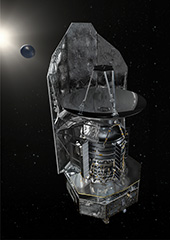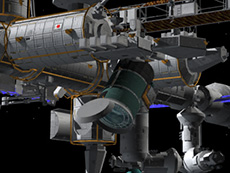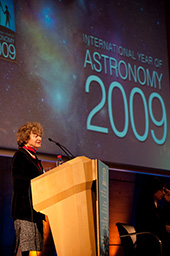
8.5-billion-year-old cluster of galaxies in the constellation Hydra and surrounding area, observed by the Subaru Telescope (Courtesy of NAOJ)
Q. What are the biggest news or discoveries this year?
The most obvious one is the discovery of more and more extra-solar planets - planets around stars other than the sun. Astronomers are developing the ability to observe planets much closer to the mass of the Earth, even though they are still bigger than the Earth. We call them super-Earth - with a mass of up to 10 times that of the Earth. Most of these extra-solar planets are big. The first ones discovered were even bigger than Jupiter. But now there is a handful of super-Earth planets discovered with various methods, and the latest one has a mass which is only about twice that of the Earth. With the methods at hand, astronomers cannot yet detect a planet like the Earth around a star like the sun. But soon there will be means to study that. So I think this is a fascinating quest. And attempts will be made to take observations of the atmosphere of these planets to see if there are signs of past or present life.
The other very interesting topic is the discovery of galaxies very, very far away from us. I hear Japan is in a very good position to do this, thanks to the Subaru telescope. When we look at a galaxy that is very far away, we see it as it was when it sent its light, which is very early in the life of the universe. The number of these galaxies is increasing, and Subaru is one instrument capable of finding them. This is making a big change in our understanding of galaxy evolution.
The most obvious one is the discovery of more and more extra-solar planets - planets around stars other than the sun. Astronomers are developing the ability to observe planets much closer to the mass of the Earth, even though they are still bigger than the Earth. We call them super-Earth - with a mass of up to 10 times that of the Earth. Most of these extra-solar planets are big. The first ones discovered were even bigger than Jupiter. But now there is a handful of super-Earth planets discovered with various methods, and the latest one has a mass which is only about twice that of the Earth. With the methods at hand, astronomers cannot yet detect a planet like the Earth around a star like the sun. But soon there will be means to study that. So I think this is a fascinating quest. And attempts will be made to take observations of the atmosphere of these planets to see if there are signs of past or present life.
The other very interesting topic is the discovery of galaxies very, very far away from us. I hear Japan is in a very good position to do this, thanks to the Subaru telescope. When we look at a galaxy that is very far away, we see it as it was when it sent its light, which is very early in the life of the universe. The number of these galaxies is increasing, and Subaru is one instrument capable of finding them. This is making a big change in our understanding of galaxy evolution.
Q. What is gaining attention in the field of astronomy this year?




Herschel Space Observatory (Courtesy of ESA/AOES Medialab)
The thing happening this year is the launching of satellites. Europe launched two satellites in May- Planck, to study the 3K background and advance cosmology, and Herschel, which is an infrared satellite. The Americans, in March, launched a satellite called Kepler, which is searching for extra-solar planets and probably has the capacity of discovering some with mass similar to Earth's. So these are examples of important events happening this year. I don't think there is an important launch at JAXA this year. But, of course, there are very important JAXA satellites flying at the moment - the Infrared Astronomical Satellite Akari, the X-ray Astronomy Satellite Suzaku, and so on, which will bring lots of results.
There is a very special eclipse coming up, on the 22nd of July. It is a total eclipse of the sun, and it's a particularly long one. It's a fantastic one. And by night, I think it will be visible in Japan, you are lucky to have it. So, on that day, be sure to go to a place without clouds and look at it. This eclipse is really special.
Q. Can you tell us about your own research?
There is a very special eclipse coming up, on the 22nd of July. It is a total eclipse of the sun, and it's a particularly long one. It's a fantastic one. And by night, I think it will be visible in Japan, you are lucky to have it. So, on that day, be sure to go to a place without clouds and look at it. This eclipse is really special.
Q. Can you tell us about your own research?

Completed image of the Atacama Large Millimeter/submillimeter Array (ALMA) (Courtesy of ESO/ALMA)
I am interested in the evolution of galaxies - not our galaxy but the other galaxies, the history of star formation through the life of the universe . How much gas went to form stars in galaxies at different times in the life of the universe? This type of work is done using astronomy at many different wavelengths, but in particular in the infrared. So it will be very useful to have the satellite Herschel. And then in the future, there is a facility being built called ALMA. It's being built in Chile by the North America, Europe and Japan. It's a world project, and it will be extremely important for my field.
Q. How do you feel about Japan's and JAXA's research in astronomy?

JEM-EUSO (Extreme Universe Space Observatory) attached to the International Space Station (Artist's Rendition) (Courtesy of RIKEN)
I think Japan has had a steady stream of satellites now for many years, in X-rays, in infrared, in solar astronomy and many other fields. All of them have been enormous successes. And now that we are going towards very big projects both on the ground and in space, the Japanese are joining with the U.S. and Europe in these world projects. You can see that with ALMA, which is on the ground. In X-rays, the big satellite in preparation, called IXO, will be a collaboration between NASA, the European Space Agency and JAXA.
JAXA is also sending a mission called JEM EUSO to the International Space Station, to study extremely high-energy cosmic waves, which is completely original. They are the only ones to do this. JAXA is a very, very strong and successful partner from everybody's point of view. And having worked a lot on ALMA myself, I can also say it's a very good partner. It's a pleasure to work with the Japanese.
JAXA is also sending a mission called JEM EUSO to the International Space Station, to study extremely high-energy cosmic waves, which is completely original. They are the only ones to do this. JAXA is a very, very strong and successful partner from everybody's point of view. And having worked a lot on ALMA myself, I can also say it's a very good partner. It's a pleasure to work with the Japanese.
Q. Were you interested in astronomy as a child? How did you start your career as a professional astronomer?


Opening ceremony of IYA 2009 (Courtesy of IAU/ Jos![]() Francisco Salgado)
Francisco Salgado)
Well, I was not brought up in an environment where people talked about science. My family was more involved in literature, arts and things like that. So I only heard about science at school. But I had very good teachers. I was lucky that I had a very good math and a very good physics teacher. I went to a French school in Buenos Aires, in Argentina. And so when I finished high school, because of my very good teachers, I decided to study math and physics. I liked mathematics very much, but I hadn't thought of astronomy yet. So I studied math and physics in university, and it was only in the fourth year that - lucky for me - a new professor arrived, and he was the first professor of astrophysics in Buenos Aires. I was looking for a thesis topic, and I thought this would be interesting. I asked him to give me a topic, and that's how I went into astrophysics. I always say, if he had arrived in Argentina a year later, I would not be an astrophysicist. So I was very lucky, because of course astrophysics has been, for me, a fantastic career, and I love it. And I'm very glad to be in this field.
Q. Can you send a personal message to the general public in your own words?
We thought about it a lot, and we came up with our motto, “the universe - yours to discover.” And I think this continues to be exactly the message we want to give: develop your own interest in this universe in which we live. We want people to look through a telescope themselves, to have their own view, to have their own understanding of what is explained to them. You know, don't just be a spectator, be an actor. And look at it, read about it, observe it if you can, think about it, and it will enhance your life.
We thought about it a lot, and we came up with our motto, “the universe - yours to discover.” And I think this continues to be exactly the message we want to give: develop your own interest in this universe in which we live. We want people to look through a telescope themselves, to have their own view, to have their own understanding of what is explained to them. You know, don't just be a spectator, be an actor. And look at it, read about it, observe it if you can, think about it, and it will enhance your life.
| Related Link : | International Year of Astronomy 2009 |
| International Astronomical Union |